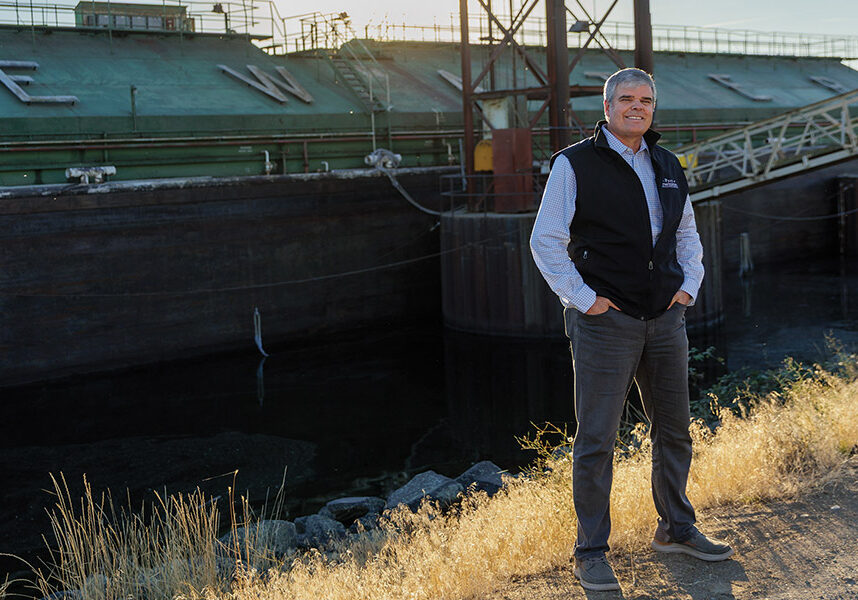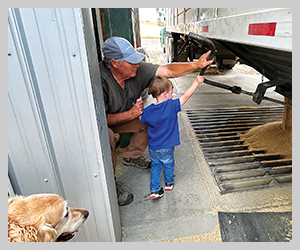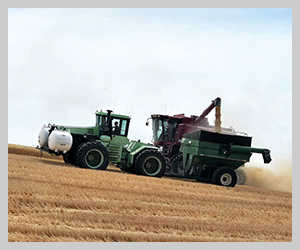Montana native’s resume sails from Navy to Idaho’s seaport Scott Corbitt, general manager, Port of Lewiston
2025November 2025
By Trista Crossley
Editor

Scott Corbitt calls his position as general manager at the Port of Lewiston the most diverse job he’s had, which is saying something from a man who once hunted submarines on a Navy destroyer.
“This job goes in 15 different directions every day, and I have to be up on 10 different industries to the point where I can negotiate with the CEO of whatever company to be a steward of the Port’s resources. It’s an incredible amount of work,” Corbitt explained.
Corbitt grew up in Kalispell, Mont., graduated from the University of Washington with a degree in biological oceanography, then went into the Navy as a commissioned officer. He spent six years on the USS O’Brien, hunting the aforementioned submarines and then as the ship’s navigator. Following his stint in the Navy, Corbitt returned to Montana, went to law school, and practiced law for about 10 years. He ended up in the Lewiston-Clarkston (LC) Valley in 2009 working for Clearwater Paper, which was followed by jobs at Schweitzer Engineering Laboratories and at an economic development agency, Valley Vision. In 2022, he became general manager of the port when the former manager of 28 years, David Doeringsfeld, retired.
“I remember the old adage, ‘never follow the guy that’s been there forever.’ You want to be the second one in, but the timing wasn’t going to work to be second, so I decided to come in and follow David and have been here for just over three years,” Corbitt said. “The things that I’ve been doing in this valley since I got here in 2009 have really been focused on trying to make the valley a better place to live and do business. That’s really what drives me. There’s so much opportunity to make that impact here (at the port) with some resources that other entities don’t have.”
Besides Corbitt’s “amazing” team, the port owns and controls its own land, which Corbitt said goes a long way towards attracting businesses, and is completely self-sufficient. Recently, the port received a $10 million allocation from Idaho’s governor to use towards projects that improve access to the port. One project finished over the summer was the completion of a cruise boat terminal at the port’s Confluence Riverfront facility.
The Port of Lewiston is an important economic driver in the LC Valley that often flies under the public’s radar. It is Idaho’s only seaport, a fact that Corbitt likes to emphasize when speaking to the public.
“The role we play in agriculture for north central Idaho and this part of Washington goes really unnoticed, but without us and the ability to bring barges up to Lewiston and have Lewis Clark Terminal fill those barges full of soft white wheat or whatever product that is going in, our economy and our society, really, would change,” Corbitt explained. “The 10.2 million bushels of storage capability give us a very unique position for being 465 miles from the ocean. It gives our farmers the ability to be able to endure a down year on yield or a down year on price because of the price advantage that barging can give to them.”
The port also provides warehousing space for manufacturers such as Clearwater Paper or Sofidel (a producer of tissue paper products), something that Corbitt said is in short supply in the LC Valley. The port is also a multimodal transportation hub, having access to rail, barges, and trucks.
“The ability to bring all of that together is really critical for the logistics of north central Idaho, and it’s critical for some of our larger businesses who really could not exist without this sort of transportation hub,” Corbitt said.
Idaho’s only seaport relies on the Columbia-Snake River System, especially the four lower Snake River dams. Corbitt calls the LC Valley “ground zero for dam removal,” explaining that there’s no other place along the river that would be more impacted by removal of the dams. He is a fierce advocate of the dams and spends much of his time talking to the public and to legislators about them.
The eight locks and dams along the Columbia-Snake River System lift vessels approximately 735 feet in elevation. Besides barges, cruise boats take advantage of the ability to navigate 465 miles inland, from Astoria, Ore., to Lewiston. In 2024, more than 20,000 cruise passengers traveled through Lewiston, bringing millions of dollars to the LC Valley.
“You have to tell them (the public), show them, educate them on why this matters to them, why this is a big deal for them,” Corbitt said. “For this valley, we talk about infrastructure. We talk about jobs, we talk about industry, we talk about the Port of Lewiston and the fact that to get to this port, you have to take eight steps up from the ocean, and without each and every one of those eight steps, you’re not going to get here.”
Corbitt said the LC Valley is also ground zero for the arguments used by the six sovereigns who oppose the presence of the dams. The six sovereigns are the states of Idaho and Washington and four Pacific Northwest tribes.
“You have to be able to understand and articulate what those perspectives are in a persuasive way that is respectful, but also cognizant of what the actual situation is, because sometimes, they’re not the same,” Corbitt said.
Managing the port is a seven-day-a-week job, but when he can, Corbitt likes to spend time outdoors. He said he also recharges by working with the “Dam Heroes” group, which is a group of stakeholders from the Pacific Northwest who have been advocating for the Columbia-Snake River System for the past few years.
“That group is different in that it has a level of passion and commitment and skill and articulation you don’t see very often, that you don’t get to interact with very often. So pulling energy from them is a way that I try to remain energized,” he explained.
Corbitt and his wife, Suzie, have two children: Madison who works in Moscow as an analytical chemist, and Jack, a culinary arts student in Pullman. To learn more about the Port of Lewiston, visit portoflewiston.com.
















